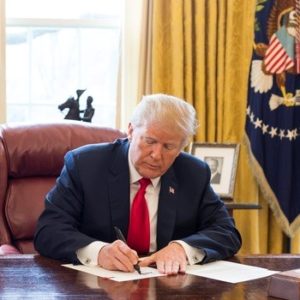How many times have you heard someone say, “If I had known then what I know now, I would have done things differently?” Or, on the sunnier side, “That was the best decision I ever made?”
As individuals, we must rely only on the information at hand when making decisions affecting our futures. Sooner or later, we’ll know if we did the right thing. Business decision-makers face the same challenge and get either a reckoning or an affirmation for their decisions, often rather quickly.
But what about the body politic? Amid so much political noise, is there any tangible, systematic feedback for the major policy decisions constantly being made? In a sense, yes, you and I must read our leaders the report card. Such is the case with Trump-era trade policies that persist in the Biden era and may find their way into a third presidential term or administration.
If the politicians at issue have their way, we’ll hear only the sunny perspective. But how many instances can you recall of a national political leader expressing remorse? In retrospect, when hard data are reviewed, the decision made three or four years ago doesn’t look so smart?
That seems reasonable in such a complicated job, but I’m guessing the answer is few, if any. Most political decision-makers are too busy making new decisions and seeking reelection to hit the pause button and focus on the isolated effects of their past actions. Instead, our republic depends on political competition to get the job done. This may also be why many think tanks and individual scholars help fill the vacuum by constantly reviewing past policy actions and providing a political reckoning.
Interestingly enough, this was done recently by a group of National Bureau of Economic Research (NBER) scholars who, in a series of independent papers, reviewed the economic effects of President Trump’s 2017-2019 eight-step expansion of tariffs on U.S. imports from the rest of the world.
These tariffs, mainly directed toward China, have generally been maintained by the Biden administration. The breadth and level of Trump’s tariff increases were unprecedented for modern times, raising weighted average import tariffs from less than 2 percent in 2015 to more than 5 percent in 2019, covering $280 billion in imports and leading to overall U.S. income losses between $7.2 billion and $8.2 billion.
Dubbing himself a “Tariff Man,” Trump justified all of this to leverage America-friendly policy reforms out of China, noting that the tariffs would fall on Chinese producers. However, the NBER researchers found that the “U.S. tariffs were largely passed through into higher prices for U.S. firms and consumers, with little evidence of reductions in the prices received by Chinese exporters.”
So, while the data indicate that U.S. consumers have suffered significantly from the Trump-now-Biden tariffs, we now have strong evidence that U.S. exporters have also suffered. The import tariffs led to losses of export markets for U.S. firms as countries hit by our tariffs retaliated. Other studies indicate that these effects resulted in a loss of 250,000 U.S. jobs and an expansion of the U.S. trade deficit with China.
After all is said and done, it’s hard to identify any winners in the Tariff Man’s struggle against trade. If we knew then what we know now, would we have supported the tariff expansions? Let’s hope not. Protectionism has long held enough political appeal to counter hard data.
The question is whether we’ll see more of the same from a second Biden administration or from one of his presidential rivals (including Trump). Given the mood of the country, the answer is most likely yes. Once nationalism takes hold, emotional responses usually carry the day.

